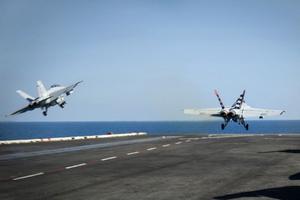ISISU.S. air strikes kill three top ISIS leaders
U.S. officials said yesterday that a U.S.-led air strikes in Iraq have killed three of the top leaders of Islamic State (ISIS), but not the group’s senior commander Abu Bakr al-Baghdadi. Among those killed was Abd al Basit, who was described by officials as the group’s military “emir,” and Haji Mutazz, a deputy to Baghdadi. The strikes took place between 3 December and 9 December, the officials said.

Two FA-16s launching from the flight deck of the USS Carl Vinson // Source: commons.wikimedia.org
U.S. officials said yesterday that a U.S.-led air strikes in Iraq have killed three of the top leaders of Islamic State (ISIS), but not the group’s senior commander Abu Bakr al-Baghdadi.
Among those killed was Abd al Basit, who was described by officials as the group’s military “emir,” and Haji Mutazz, a deputy to Baghdadi. The strikes took place between 3 December and 9 December, the officials said. The officials also confirmed last month’s killing of Radwan Taleb al-Hamdouni, who was ISIS’s leader in the northern city of Mosul.
The killings were first reported by the Wall Street Journal.
The Guardian reports that the news of the killing of the organization’s senior leaders came the same day that Lieutenant General James Terry, the top U.S. commander of the coalition campaign against ISIS, hailed the impact of four months of air strikes in Iraq.
“We’ve made significant progress in halting that (militant) offensive,” Terry told reporters.
He pointed to successful air strikes this week around Iraq’s Sinjar mountain and Zumar.
Those heavy air strikes helped Kurdish peshmerga fighters fight their way to Sinjar mountain and, according to a Kurdish leader, free hundreds of people trapped there by ISIS fighters.
Masrur Barzani, chancellor of Kurdistan Region Security Council, said the Kurdish forces advanced in battle, establishing the passageway to the mountain on Thursday. He emphasized that Iraqi forces were in no way part of the operation.
“We asked the Iraqi government to provide the ammunition needed for this operation. Unfortunately they did not send the ammunition and their contribution was nothing, to be quite frank with you, especially for this operation,” Barzani told the AP in Dohuk, in Iraq’s Kurdish region
In his talk with reporters Thursday, Terry outlined a long fight ahead, cautioning that it would take at least three years to build necessary capabilities of Iraqi forces who collapsed almost without fight during ISIS’s offensive this summer.
